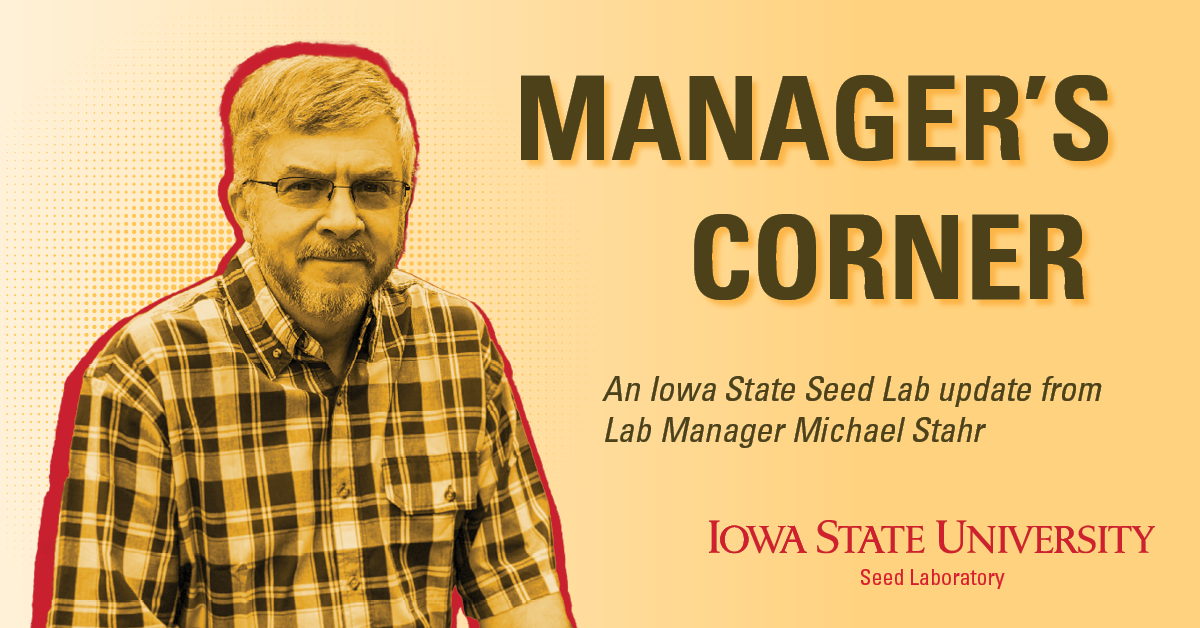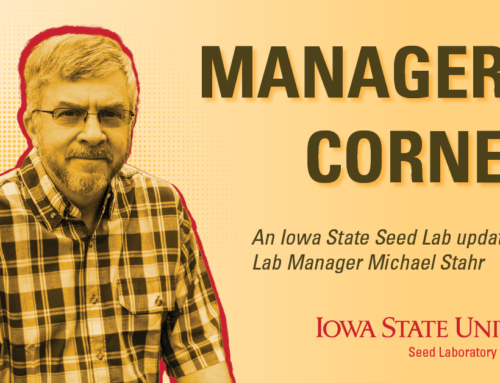I typically say that autumn is my favorite time of the year. After a frost, insect pests are gone, and temperatures are moderate. I welcome spring after dealing with an Iowa winter, but I don’t look forward to the mud, in the garden, in the barn lot (mud and more!), and in the field. That hasn’t been much of an issue this spring as Iowa hopes to recover from a drought.
Interestingly, two of the non-Health tests we offer that have increased most in popularity are the saturated cold test and the fast green test. It has been a very busy testing season in both health testing and “non-Health testing.” The saturated cold test inflicts more stress (normally done on corn, but sometimes on soybean and other types of seeds) than a regular cold test. With much of the Midwest experiencing warmer than average temperatures this spring, the cold test might be a better indication of the suitability of seed to deal with wet and cold field conditions.
The fast green test is typically done on “field” corn seeds (we’ve done it on popcorn, sweet corn, and sorghum) and indicates damage to the pericarp, which is the outer layer of a grass family seed not a seed coat. I believe that the fast green test is most useful to track damage that may have been caused during conditioning. Since the embryo of corn seed is well protected, I don’t think that the fast green test is a good predictor of the results of a germination test. Unlike the sodium hypochlorite (soak) test on soybeans which is a good predictor unless there are fungal issues in the seed lot.
Wow, it was good to lead off a column without mentioned COVID! While we continue to work to protect Seed Science personnel from COVID and it continues to complicate planning and holding workshops, we are breathing a bit of a sigh of relief as COVID drops back. At this point, the earliest a seed testing workshop could be held at ISU Seed Science would be in August, but that depends on COVID continuing to diminish. Please check the Training page of this website for updates.
It is encouraging that ASTA plans to hold an in-person CSS Seed Conference next December. Many seed-related conferences this summer (AOSA/SCST, AASCO, AOSCA) will be held virtually. The AOSA SCST Annual Meeting is set to be held June 14-17. Details can be found at www.Analyzeseeds.com. It is neat that anybody can view the Open Rules session and other larger sessions of the annual meeting by paying a small fee. Committee meetings likely will be held in May. The ISU Seed Lab tests according to the AOSA Rules, ISTA Rules, or the Canadian M&P, as is appropriate. The AOSA SCST website contains details of two year’s worth of Rule proposals that will be considered in June.
The end of May will be both happy and sad for the Seed Lab as friendly, capable Customer Care lead Cherie Hill will be retiring. Whether you’ve talked to her on the phone, exchanged e-mails, or talked to her at a seed conference, you experienced her adding a personal aspect to doing business with the Iowa State University Seed Lab. While the Seed Lab is large enough to offer more than 50 types of tests on more than 300 species of seeds (far more than corn and soybeans!) and test for over 350 pathogens, we appreciate being able to offer “next-door neighbor” type service due to people like Cherie. We wish her an amazing retirement!
—Mike Stahr, ISU Seed Lab Manager


